Tuesday, December 2, 2014
Russian Ruble Crashes To New Record is Intervention Imminent?

Despite yesterday's big bounce back in the price of oil, this morning's weakness across the crude complex has rekindled selling pressure on the Russian Ruble as it crashes back to yesterday's record lows against the USD.

At around 54 Ruble to the USD, yesterday saw 'alleged' intervention by the Russian Central Bank with a dramatic reversal back to around 50 intraday... it appears the market wants to test the Central Bank's free-float commitment once again.

Yesterday saw notable Treasury selling as the Ruble was rescued/intervened, one wonders if the move higher in yields for 30Y bonds in the last few minutes signal Russian central bank intervention coming soon.
Credit to Zero Hedge
Islamic State May Possess Nuclear Material Stolen From Iraq
LONDON: Islamic State terror group may have developed a nuclear device by using radioactive uranium stolen from Iraq's Mosul University after seizing control of the city last June, according to a British media report.
Militants boasted of the device on social media, with one even commenting on the destruction such a bomb would wreak in London, four months after the chemical went missing from Mosul University, Mirror newspaper reported.
One of the extremists making online threats to the West is British explosives expert Hamayun Tariq, who fled his home in the UK for the Middle East in 2012.
Using the alias, Muslim-al-Britani, he tweeted, "O by the way, Islamic State does have a dirty bomb. We found some radioactive material from Mosul University."
He wrote: "We'll find out what dirty bombs are and what they do. We'll also discuss what might happen if one actually went off in a public area."
A dirty bomb is a speculative radiological weapon that combines radioactive material with conventional explosives.
It is claimed the device includes uranium from a stash of 40 kilograms looted by IS.
Iraq's UN Ambassador Mohamed Ali Alhakim informed UN Secretary-General Ban Ki-moon of the theft in a letter on July 8.
He wrote: "Terrorist groups have seized control of nuclear material at the sites that came out of the control of the state."
If the bomb does exist, militants are far more likely to use it in Syria or Iraq, rather than trying to smuggle it into a Western country, the report said.
The IS militants have captured swathes of territory in Iraq and Syria. It is a splinter group of the al-Qaeda which has distanced itself from the outfit, chiding it for its aggressive and brutal expansion.
The IS gained international attention in August, when its fighters and those from other militant groups swept through the northern Iraqi city of Mosul, then overran swaths of territory north and west of Baghdad.
Credit to NDTV
NATO prepares 'spearhead' to ward off Russia
NATO Secretary General Jens Stoltenberg has voiced concern about Russia's "aggressive" behavior. He told a press conference that the alliance was working on a "spearhead" to deter any possible threat.
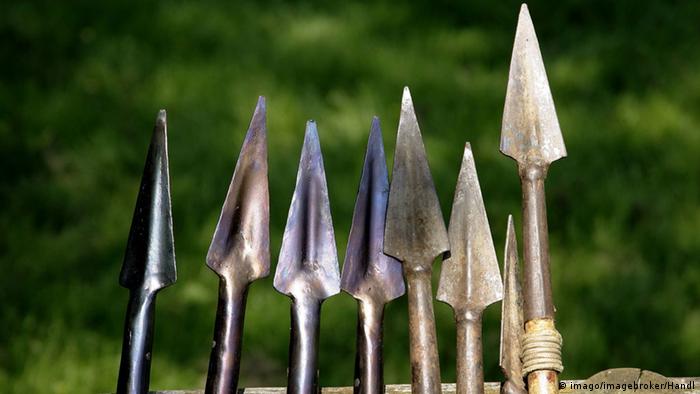
Beginning early next year NATO will have a new reaction force ready, which can be deployed more rapidly on its eastern border. This new force, called "interim spearhead," will consist of a few hundred troops from Germany, the Netherlands and Norway. Troops will rotate in terms of their state of readiness, but remain at bases in their home countries.
The new secretary general of NATO, Jens Stoltenberg, announced the plan to support the Baltic members of the alliance during a press conference in Brussels at NATO headquarters.
Concerned by increased Russian military activities on land, at sea and in the air in the wake of the crisis around Ukraine, NATO decided at its summit meeting in Wales in early September to strengthen its military presence in the Estonia, Lithuania and Latvia, which have a common border with either Russia or Belarus.
NATO chief diplomat Jens Stoltenberg told reporters that, in his view, Russia continues to violate international law and is shipping goods and weapons to the pro-Russian rebels in eastern Ukraine. In 2016, he said, NATO intends to have a fully equipped spearhead force in place, which could be deployed to the Baltic member states in 48 hours to "deter and defend" in every possible crisis. The secretary general called on Russia to make a choice and to return to the negotiating table. "It will be an advantage for Russia, but also an advantage for NATO, if Russia chooses another path and starts to respect international law and the sovereignty of all nations and the rule-based system, we have tried to establish for so many years in Europe", said Stoltenberg.
Russia wary of 'destabilization'
The reaction from Moscow was quick. NATO was destabilizing northern Europe by holding exercises and "transferring aircraft carriers able to carry nuclear weapons to the Baltic sea", the Russian deputy ministers for foreign affairs, Alexei Meshkow, told the news agency Interfax.
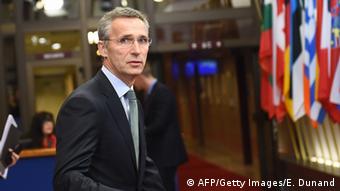
However, Stoltenberg stressed the alliance would not have any direct military role in the crisis around Ukraine. The western alliance would not deliver weapons or equipment, Stoltenberg told the international press, but some NATO-member states could do that on a bilateral basis.
NATO set up several trust funds to finance military reforms and better training for the armed forces in Ukraine. "We stick to our open door policy", said Stoltenberg.
Ukraine, Georgia and other democracies can become NATO members in the future. There will be no formal or informal guarantees to Russia in that respect, underlined NATO diplomats in Brussels. Russia is opposing the possible enlargement of NATO vigorously. "My main message is that I respect the decisions taken by the Ukrainians. Ukraine decided some years ago to be a non-bloc nation. Then, I respected that. Now, I have seen that the new government is announcing that they will change that. If they do, I will of course respect that too", said Stoltenberg.
Conciliatory approach
Behind the scenes, the former Norwegian prime minister is trying to convince his Russian counterparts to again participate in the NATO-Russia-Council. This body was created to deal with all questions concerning the security of Russia and NATO, but the meetings are suspended since the beginning of the Ukraine crisis and the annexation of Crimea by Russia. Stoltenberg's rhetoric towards Moscow is less sharp than the belligerent words of his predecessor Anders Fogh Rasmussen. Although he insists that Russia's behavior towards NATO is more "aggressive" than last year, he wants to open up a new channel for dialogue, said NATO diplomats in Brussels.
NATO is about to launch its new mission "Resolute Support" in Afghanistan in January 2015. The former combat mission to fight terrorism and the Taliban is coming to a close soon. Most of the combat troops, present there for almost 13 years, have already left the country. The new support mission for the Afghan security forces will consist of 20 000 troops, mainly from the US. In many parts of the country, Taliban rebels are intensifying their attacks to put pressure on the new government of President Ashraf Ghani. NATO secretary general Jens Stoltenberg insisted that the security situation is not deteriorating and that the new mission will not have a combat role.
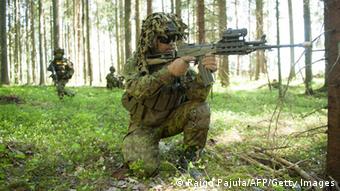
"I am very much aware that there have been attacks and we also have seen casualties. But at the same time we have seen strong and capable national security forces of Afghanistan being able to be responsible for security all over the country."
Seeking Afghan stability
The Afghan security forces have now 350, 000 men and women under arms, but many experts fear they are still not able to guarantee stability in all parts of the war-torn country. President Ghani will meet the foreign ministers of NATO on Tuesday in Brussels to talk about his plans to reform the security forces. Referring to media reports, he intends to replace senior civilian and military leaders in some volatile provinces of Afghanistan to reinvigorate the fight against Taliban militants.
After four weeks in office the new secretary general of NATO, Jens Stoltenberg, is not very happy about the fact that NATO is so much in the spotlight. As the year 2014 comes to a close, the challenges for NATO are much more complicated with threats creeping in from the east and the south, meaning Russia and the ISIL-Terrorists, said Stoltenberg. "The reason why NATO is more in the focus now is that we have a more dangerous world. And of course I never welcome a more dangerous world."
Credit to DW
Russia launches ‘wartime government’ HQ in major military upgrade

Russia is launching a new national defense facility, which is meant to monitor threats to national security in peacetime, but would take control of the entire country in case of war.
The new top-security, fortified facility in Moscow includes several large war rooms, a brand new supercomputer in the heart of a state-of-the-art data processing center, underground facilities, secret transport routes for emergency evacuation and a helicopter pad, which was deployed for the first time on Nov. 24 on the Moscow River. The Defense Ministry won’t disclose the price tag for the site, but it is estimated at the equivalent of several billion dollars.
The new National Defense Control Center (NDCC) is a major upgrade on what was previously called the Central Command of the General Staff, a unit tasked with round-the-clock monitoring of military threats against Russia, particularly ballistic missile launches, and deployment of strategic nuclear weapons. It was roughly a counterpart to the US National Military Command Center, the Pentagon’s principal command and control site.
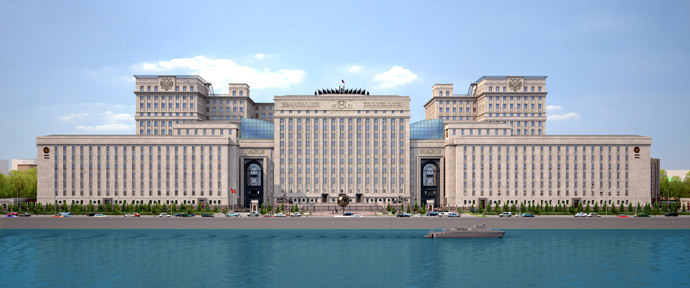
Image by Defence Ministy
The NDCC inherits all those functions, but also has plenty of extra roles as well. In peacetime, an additional task is to monitor all of Russia’s important military assets, from hardware being produced by defense contractors to the state of oil refineries, to weather conditions and their effect on transportation routes.
And if Russia does get into a war, the center would act as a major communication hub and a form of wartime government, delivering reports to the country’s military command and giving orders to all ministries, state-owned companies and other organizations, according to the needs of the armed forces.
“The creation of NDCC was one of the biggest military projects of the past few years. The closest analogy in the past in terms of functions and tasks was the Commander-in-Chief HQ in 1941-45, which centralized all controls of both the military machine and the economy of the nation in the interests of the war,” Lt. General Mikhail Mizintsev, the NDCC chief, told Lenta.ru in an interview.
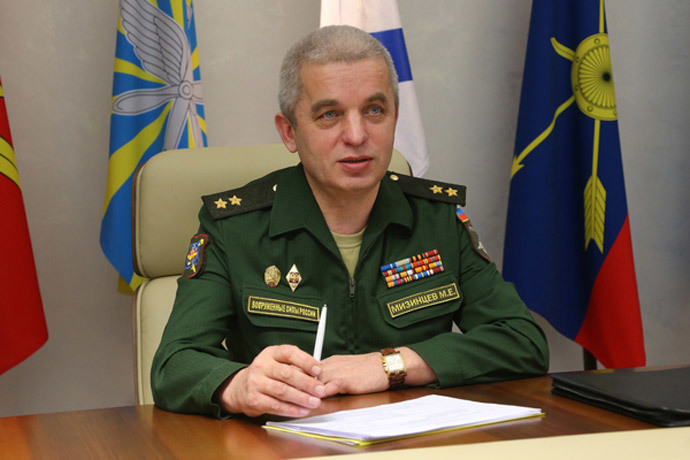
Lt. General Michail Mizintsev. Image by Defence Ministy
The military says the upgrade has been long overdue. The national security situation may be very fluid in modern times, and instead of days the leadership may have only an hour to take crucial military decisions. The center’s job is to offer the Defense Minister and the President options in case of emergency, which would be based on facts, figures and accurate projections.
Potentially the biggest part of the upgrade was the creation of communication and data processing equipment that would give the military computer power and software needed to factor in hundreds of parameters in their mathematical models. The Defense Ministry had to use only domestically-produced hardware due to security considerations, which limited its options.
According to officials, the result is a very robust computer network with state-of-art data encryption and multiple backup sites spread throughout the country, which would keep the center functional even if its main facility in Moscow is damaged by an enemy attack or sabotage.
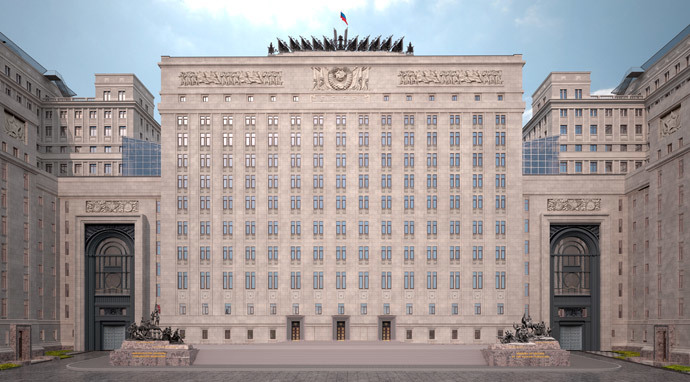
Image by Defence Ministy
The center employs over 1,000 officers working on a rotating watch system. Mizintsev said the armed forces selected their best officer for the posts, many of which are new for the Russian military and require skills not previously taught to officers on a regular basis until recently. They have been operating in trial mode since April.
A thoroughly military facility, the NDCC has an unexpected civilian component to it. Its location in Moscow is close to two major hospitals, including the Pirogov trauma center. Both hospitals are quite old and their original designs didn’t provide for dedicated helicopter pads.
The Defense Ministry said the medics can share NDCC’s new pad on the Moscow River for emergency patient transportation. The pad can accommodate helicopters weighing up to 15 tons, enough to land a Mil Mi-8, world’s most-produced transport helicopter, or a Mil Mi-38, its designated replacement.

A Topol-M ballistic missile (RIA Novosti / Vitaliy Belousov)
Credit to RT
Tensions Between US & Russia Are Worse Than You Realize – Foreign Minister Sergey Lavrov
“I am young, I am twenty years old; yet I know nothing of life but despair, death, fear, and fatuous superficiality cast over an abyss of sorrow. I see how peoples are set against one another, and in silence, unknowingly, foolishly, obediently, innocently slay one another.”– Erich Maria Remarque, All Quiet on the Western Front
Despite an interest in geopolitics, I haven’t really written anything on the concerning and worsening tension between the government of the United States and the government of Russia. I intentionally wrote government twice in order to emphasize the fact that 99.9% of Americans do not have real grievances with actual Russian people, and vice versa. This is a high-level conflict between powerful “leaders” playing a game of Risk with average citizen as pawns. This is how it’s always been. As human beings, we should never lose sight of this so the mistakes we make in the future aren’t nearly as tragic as those made by our ancestors.
One disconcerting thing I have noticed amongst some “liberty-minded” people I follow, is a knee-jerk tendency to pick a side in this affair. When it comes to powerful men running centralized nation-states with nuclear weapons, there are no church boys involved. I have noticed a desire to defend Russia every step of the way in what appears to be a simple-minded emotional reflex birthed in justifiable disgust with what they see happening in their home nations (the U.S. and UK in particular).
This behavior has always made me uncomfortable, and reminds me very much of how people get upset with one fake political party and then vote for the other guy simply because they are not a Democrat or a Republican. The best choice is to accept they are both useless and not vigorously defend either party. I take the same tact when it comes to battles between nation-states. Just because I am disgusted and horrified with what is happening in these United States, doesn’t mean I need to slavishly defend Russia, Vladimir Putin or pick any sides in a conflict in which the primary losers will always be powerless civilians.
I’ve never been to Russia, thus my opinion of the country is basically worthless. Nevertheless, based on what I have read and observed, I’d still much rather live in the U.S. than Russia despite all of our society’s failings and decay in recent decades. While this view could certainly change as time and events unfold, that is how I strongly feel at the moment. Putin is by all accounts an authoritarian cult-like leader who wants to ban Bitcoin, journalism can be a deadly affair, and oligarchs continue to run free (as long as you are friends with Putin). Recall my recent post: American Upper Middle Class Share of Wealth is Worse than Every Country Besides Russia and Indonesia. Yes, “besides Russia and Indonesia.” Russia is no economic utopia.
Nevertheless, this piece isn’t meant to be a pointless debate about which overly-centralized, archaic and corrupt nation-state is better than the other. Neither place has a political or economic structure that even comes close to providing a fertile environment in which human existence can reach its highest potential. Rather, both nation-states are controlled by a small group of ambitious, authoritarian and, when necessary, ruthless and violent men and women. That said, there are two reasons I think the following remarks by Russian Foreign Minister Sergey Lavrov are so important.
First, as someone who spends much of his time analyzing and critiquing the many destructive policy decisions made by American “leaders,” I was shocked to find how accurate his description of the U.S. power structure’s mindset seems to be. He gets it, and he is more or less trying to warn the world that America’s leaders are basically power-drunk children. I concur.
Second, Lavrov also describes the negative impact that this behavior has had on the Russian psyche generally. He expresses dismay that the U.S. status quo sees the world as unipolar, and attempts to tackle every problem from the perspective that might is right. In no uncertain terms, Lavrov makes it clear that Russia will not stand for this. I don’t think the Russians are bluffing, so this is a very dangerous situation.
If there was actually someone in the U.S. State Department capable of such introspective and clear thinking, we might actually diffuse this situation. Don’t hold your breath.
Here are some excerpts from Mr. Lavrov’s remarks at the XXII Assembly of the Council on Foreign and Defence Policy in Moscow on November 22, 2014. The whole thing can be found here, which I strongly suggesting reading in full.
I’m happy to be at this annual Assembly of the Council on Foreign and Defence Policy (Russian abbreviation SVOP). It is always a great pleasure for me to meet people and feel the intellectual potential, which enables the Council, its leaders and representatives to respond to global developments and analyse them. Their analysis is always free from any hysteria, and its members offer well-grounded and solid arguments, taking a step back, since those caught in the midst of events can hardly adopt an unbiased perspective. We are inevitably influenced by the developments, which makes your observations, analysis, discourse and suggestions even more valuable to us.Naturally, I will start with Ukraine. Long before the country was plunged into the crisis, there was a feeling in the air that Russia’s relations with the EU and with the West were about to reach their moment of truth. It was clear that we could no longer continue to put issues in our relations on the back burner and that a choice had to be made between a genuine partnership or, as the saying goes, “breaking pots.” It goes without saying that Russia opted for the former alternative, while unfortunately our Western partners settled for the latter, whether consciously or not. In fact, they went all out in Ukraine and supported extremists, thereby giving up their own principles of democratic regime change. What came out of it was an attempt to play chicken with Russia, to see who blinks first. As bullies say, they wanted to Russia to “chicken out” (I can’t find a better word for it), to force us to swallow the humiliation of Russians and native speakers of Russian in Ukraine.Honourable Leslie Gelb, whom you know all too well, wrote that Ukraine’s Association Agreement with the EU had nothing to do with inviting Ukraine to join the EU and was aimed in the short term at preventing it from joining the Customs Union. This is what an impartial and unbiased person said. When they deliberately decided to go down the path of escalation in Ukraine, they forgot many things, and had a clear understanding of how such moves would be viewed in Russia. They forgot the advice of, say, Otto von Bismarck, who had said that disparaging the millions-strong great Russian people would be the biggest political mistake.President Vladimir Putin said the other day that no one in history has yet managed to subjugate Russia to its influence. This is not an assessment, but a statement of fact. Yet such an attempt has been made to quench the thirst for expanding the geopolitical space under Western control, out of a mercantile fear to lose the spoils of what they across the Atlantic had persuaded themselves was the victory in the Cold War.The plus of today’s situation is that everything has clicked into its place and the calculus behind the West’s actions has been revealed despite its professed readiness to build a security community, a common European home. To quote (singer/song-writer) Bulat Okudzhava, “The past is getting clearer and clearer.” The clarity is becoming more tangible. Today our task is not only to sort out the past (although that must be done), but most importantly, to think about the future.Talks about Russia’s isolation do not merit serious discussion. I need hardly dwell on this before this audience. Of course, one can damage our economy, and damage is being done, but only by doing harm to those who are taking corresponding measures and, equally important, destroying the system of international economic relations, the principles on which it is based. Formerly, when sanctions were applied (I worked at the Russian mission to the UN at the time) our Western partners, when discussing the DPRK, Iran or other states, said that it was necessary to formulate the restrictions in such a way as to keep within humanitarian limits and not to cause damage to the social sphere and the economy, and to selectively target only the elite. Today everything is the other way around: Western leaders are publicly declaring that the sanctions should destroy the economy and trigger popular protests. So, as regards the conceptual approach to the use of coercive measures the West unequivocally demonstrates that it does not merely seek to change Russian policy (which in itself is illusory), but it seeks to change the regime — and practically nobody denies this.We hear the daily repeated mantra that Washington is aware of its own exclusiveness and its duty to bear this burden, to lead the rest of the world. Rudyard Kipling spoke about “the white man’s burden.” I hope that this is not what drives Americans.The world today is not white or black, but multi-coloured and heterogeneous. Leadership in this world can be assured not by persuading oneself of one’ exclusiveness and God-given duty to be responsible for everyone, but only by the ability and craft in forming a consensus. If the US partners committed their power to this goal, this would be priceless, and Russia would be actively helping them.However, so far, US administrative resources still work only in the NATO framework, and then with substantial reservations, and its writ does not reach beyond the North Atlantic Alliance. One proof of this is the results of US attempts to make the world community follow its line in connection with the anti-Russian sanctions and principles. I have spoken about it more than once and we have ample proof of the fact that American ambassadors and envoys across the world seek meetings at the highest level to argue that the corresponding countries are obliged to punish Russia together with them or else face the consequences. This is done with regard to all countries, including our closest allies (this speaks volumes about the kind of analysts Washington has). An overwhelming majority of the states with which we have a continuing dialogue without any restrictions and isolation, as you see, value Russia’s independent role in the international arena. Not because they like it when somebody challenges the Americans, but because they realize that the world order will not be stable if nobody is allowed to speak his mind (although privately the overwhelming majority do express their opinion, but they do not want to do so publicly for fear of Washington’s reprisals).Many reasonable analysts understand that there is a widening gap between the global ambitions of the US Administration and the country’s real potential. The world is changing and, as has always happened in history, at some point somebody’s influence and power reach their peak and then somebody begins to develop still faster and more effectively. One should study history and proceed from realities. The seven developing economies headed by BRICS already have a bigger GDP than the Western G7. One should proceed from the facts of life, and not from a misconceived sense of one’s own grandeur.In attempting to establish their pre-eminence at a time when new economic, financial and political power centers are emerging, the Americans provoke counteraction in keeping with Newton’s third law and contribute to the emergence of structures, mechanisms, and movements that seek alternatives to the American recipes for solving the pressing problems. I am not referring to anti-Americanism, still less about forming coalitions spearheaded against the United States, but only about the natural wish of a growing number of countries to secure their vital interests and do it the way they think right, and not what they are told “from across the pond.” Nobody is going to play anti-US games just to spite the United States. We face attempts and facts of extra-territorial use of US legislation, the kidnapping of our citizens in spite of existing treaties with Washington whereby these issues are to be resolved through law enforcement and judicial bodies.According to its doctrine of national security, the United States has the right to use force anywhere, anytime without necessarily asking the UN Security Council for approval. A coalition against the Islamic State was formed unbeknownst to the Security Council. I asked Secretary of State John Kerry why have not they gone to the UN Security Council for this.Francis Fukuyama recently wrote the book, Political Order and Political Decay, in which he argues that the efficiency of public administration in the United States is declining and the traditions of democratic governance are gradually being replaced with feudal fiefdom ruling methods. This is part of the discussion about someone who lives in a glass house and throws stones.
Indeed, describing, lamenting and suggesting remedies for the above is basically what Liberty Blitzkrieg is all about. Don’t forget, an academic study from Princeton and Northwestern already proved the U.S. is nothing more than an oligarchy. See: New Report from Princeton and Northwestern Proves It: The U.S. is an Oligarchy.
So far, those who are not guided by real problems, but rather by a desire to quickly grab things from freshly turned up ground. It is deplorable. Exporting revolutions – be they democratic, communist or others – never brings any good.I can’t fail to mention Russia’s comprehensive partnership with China. Important bilateral decisions have been taken, paving the way to an energy alliance between Russia and China. But there’s more to it. We can now even talk about the emerging technology alliance between the two countries. Russia’s tandem with Beijing is a crucial factor for ensuring international stability and at least some balance in international affairs, as well as ensuring the rule of international law. We will make full use of our relations with India and Vietnam, Russia’s strategic partners, as well as the ASEAN countries. We are also open to expanding cooperation with Japan, if our Japanese neighbours can look at their national interests and stop looking back at some overseas powers.There is no doubt that the European Union is our largest collective partner. No one intends to “shoot himself in the foot” by renouncing cooperation with Europe, although it is now clear that business as usual is no longer an option. This is what our European partners are telling us, but neither do we want to operate the old way. They believed that Russia owed them something, while we want to be on an equal footing. For this reason, things will never be the same again. That said, I’m confident that we will be able to overcome this period, lessons will be learned and a new foundation for our relations will emerge.
The similarities to the period just before WWI are indeed striking, as Niall Ferguson noted in an excellent Op-Ed in August. Hopefully we can be smarter this go around.
Credit to Zero Hedge
Total US Debt Rises Over $18 Trillion
Last week, total US debt was a meager $17,963,753,617,957.26.
Two days later, as updated today, on Black Friday, total outstanding US public debt just hit a new historic level which probably would be better associated with a red color: as of the last work day of November, total US public debt just surpassed $18 trillion for the first time, or $18,005,549,328,561.45 to be precise, of which debt held by the public rose to $12,922,681,725,432.94, an increase of $32 billion in one day.
It also means that total US debt to nominal GDP as of Sept 30, which was $17.555 trillion, is now 103%. Keep in mind this GDP number was artificially increased by about half a trillion dollars a year ago thanks to the "benefit" of R&D and intangibles. Without said definitional change, debt/GDP would now be about 106%.
It also means that total US debt has increased by 70% under Obama, from $10.625 trillion on January 21, 2009 to $18.005 trillion most recently.
And now we wait for the US to become Spain, and add the estimated "contribution" from hookers and blow to GDP, once again pushing the total debt/GDP ratio below the psychological 100% level.
Credit to Zero Hedge
Subscribe to:
Comments (Atom)
